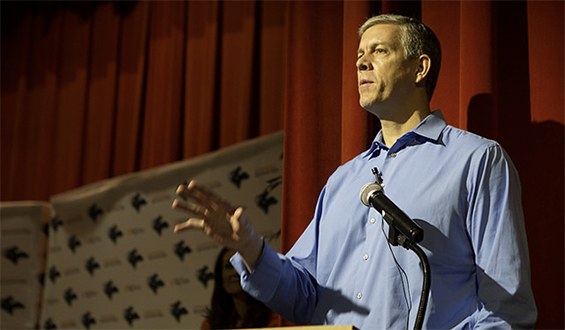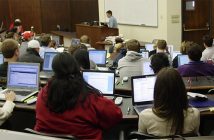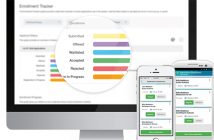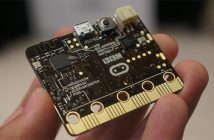
Outgoing Secretary of Education Arne Duncan spoke about his visions for the future of American education at Hispanic Engineering, Science, and Technology (HESTEC) week.
The fourteenth iteration of the week-long event, held at the University of Texas Rio Grande Valley, focuses on improving science, technology, engineering, and math (STEM) education for Latino students in America with the goals of increasing their opportunity and improving the lack of diversity in high-tech workplaces.
US Rep. Ruben Hinojosa introduced Duncan to an auditorium of students and educators, to whom he spoke about the importance of STEM education, increasing the availability of blended learning, and why districts should be spending their money on devices instead of textbooks.
According to Duncan, high-tech companies have trouble finding qualified Americans to work on their projects. Danya Perez-Hernandez of the Monitor quoted him:
I can’t tell you how many CEOs, how many company leaders I’ve met with, and President Obama has met with, that say ‘We want to grow, we want to keep good jobs in our community, but we can’t find the workforce.’
Duncan stressed the importance of blended learning, since it allows students to learn outside the classroom and to use their time in school more efficiently. Imelda Mejia of Valley Central related a story of math teacher Sam Nieto and his use of classroom technology. He starts class by showing students a lesson plan on his website, and then sets them to work on problems at their own pace while he visits individually with students to check on their progress. Duncan said:
The goal is to be able to have all of you students being able to learn everything you want, anywhere. The idea of just sitting in class and the only chance to learn is six hours a day, five days a week, nine months out of the year, simply doesn’t make sense anymore.
In a message specifically to superintendents, he noted that using devices over textbooks is budget-friendly and also helps students access the most up-to-date and pertinent information. In quickly-growing fields like technology and the sciences, print textbooks are often no longer relevant by the time they reach students.
Students who use devices over textbooks also have the advantage of being more tech-savvy and comfortable with technology, which is growing in importance as a job skill. Robert Schoon of the Latin Post quoted Duncan:
When we buy textbooks, most of those textbooks become obsolete the minute they show up in the classroom. WIthout a huge influx of money, we have to stop doing some things. As a nation, every year we spend $70 to $90 billion on textbooks and I much prefer to see districts starting to put that money into devices.
Despite his focus on growing the use of educational technology, Duncan emphasized the role of teachers, especially those who are trained in the STEM fields.
The idea of being able to learn anything we want at any time, anywhere we want, but also having a great teacher to talk to, to ask questions, to get feedback, I think those two things together are always going to be the most powerful.
According to Nicole Gorman of Education World, Duncan also advocated a program that will bring internet access to underprivileged students.




